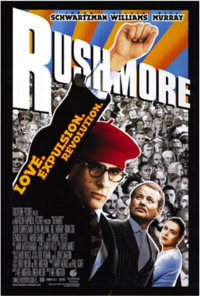
“Adios, Esposito.”
“Adios, Sarge. Say a prayer for Surf Boy… wherever he is.”
“Semper fi, soldier. Semper fi.”
”Sic transit gloria. Maybe we’ll meet again some day, when the fighting stops.”
From “Heaven and Hell”, a play by Max Fischer
Rushmore is an odd film.
I enjoyed it, but it’s definitely not the kind of film that can be summed up in a single sentence. It’s about a fifteen-year-old and a middle-aged multimillionaire who both fall for the same woman, but it’s also a coming-of-age story, a drama with comic overtones, an oddball take on obsession and romance and death. Like I said, it’s unusual and not without flaws.
But the main character of Rushmore pulled me in right away, and if a character makes me care, I can put up with anything. Max Fischer is a precocious student at the exclusive Rushmore Academy, which he loves. Unfortunately he’s failing in every subject, mostly because of the dozen or more clubs and societies he runs or has founded. A movie critic wrote that Max could be very good at something if he wasn’t trying to do everything, and that’s a perfect description.
Max isn’t an attractive character, but he’s compelling. He’s a charismatic control freak, combining an adult’s intellect with a teenager’s inability to see anyone else’s point of view. His enthusiasm leads to a friendship with Herman Blume, an alumnus of Rushmore. Blume survived Vietnam and is now extremely rich, but his wife has no interest in him and he feels purposeless.
The point of the triangle is Ms Cross, a widowed teacher at Rushmore. Max fixates on her with all his usual drive, not particularly dissuaded by the Mary Kay Letourneau overtones of the situation. This, coupled with his poor academic record, is too much and he’s expelled from Rushmore. Blume takes a written apology from Max to Ms Cross and becomes interested in her himself. Max finds out and does everything in his power to get revenge.
One thing I like about Rushmore is that it’s never evident where the story’s going to end up. Max’s expulsion, the escalating revenge games, the resolution of the romance… none of this is predictable. The characters proceed under their own power rather than following a pattern a writer has laid out for them in advance (Part 1: Boy meets Girl, Part 2: Boy loses Girl, Part 3: Boy gets Girl back).
On the other hand, this might come off as meandering, and this isn’t a fast-paced movie that will keep you on the edge of your seat. The revenge games, for instance, don’t end in a cathartic climax – instead, Max realizes that no matter what he does, he isn’t going to have Ms Cross. Then he has to decide what to do with his life, having lost both of his obsessions. I like the ending, since it features a play and a far more appropriate love interest, but I don’t think it would work for everyone.
The supporting cast are well-written. Ms Cross is intelligent and beautiful, but she also wants what she can’t have – her husband, who drowned a year ago. She keeps her dignity in the face of Max’s admittedly puerile advances, getting him in an armlock when he tries to kiss her and making him run for cover. Then there’s Dirk Calloway, who is a friend/secretary/pupil to Max, and roughneck Magnus Buchan.
“I always wanted to be in one of your fuckin’ plays.”
Magnus Buchan, after Max resolves their rivalry by giving him a script and a part.
Rushmore features an evocative soundtrack and shoutouts to movies such as Reservoir Dogs, but my favorite part is the play at the end – written and directed by Max – which touches on the movie’s themes of friendship, romance and death in the context of the Vietnam War. I love it. Granted, that’s because there’s dynamite, fire, model planes in the background and two people training guns on each other while proposing marriage. But hey, nothing wrong with alternating the contemplative with the explosive. All’s fair in love and war.






7 comments:
Rushmore owns.
There's only one thing I regret about watching Rushmore, and that's becoming curious about Reservoir Dogs. So I looked it up on YouTube and clicked on a clip.
That turned out to be the infamous ear scene, and that's all I have to say.
If you liked Rushmore, see The Royal Tenenbaums, it's a movie by the same director, similar feel but a more complicated plot.
Bottle Rocket, also by Anderson is pretty good too. Probably my favorite of all his films but it's much weirder.
And I agree with GunnerJ on Tenenbaums, definitely one to see if Rushmore did anything for you.
Steve Buscemi's over the top Mr. Pink performance is a total gem in Reservoir Dogs. Michael Madsen ain't so bad either. I think the ear scene is about as gory as it gets, if that means anything.
It was the sheer violence of that scene. I kept imagining what raw gasoline on an open wound felt like.
When I looked Reservoir Dogs up on Wikipedia, the article said that the actor playing the cop ad-libbed a line about not killing him because he had a kid. Michael Madsen supposedly had some difficulty finishing the scene after that.
I did enjoy the anti-tipping scene, though. It's total Tarantino. The characters kill people right and left, but God forbid one of them should refuse to tip a waitress.
Nicely written review.
I actually never saw the film, but my sister loves it.
Thanks, Tasha! :)
I'm hoping to write reviews of Chocolat and Twelve Angry Men as well some time. I'll see if The Royal Tenenbaums is available on YouTube.
Post a Comment